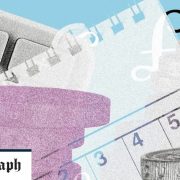Young people are taking on more debt and damaging their credit scores thanks to the availability of cheap and easy borrowing that encourages them to spend beyond their means.
So-called “buy now, pay later” services allow online shoppers to purchase clothes and beauty products worth hundreds of pounds without spending a penny up front.
They differ from traditional credit cards and personal loans as they are offered during the checkout process of online retailers, after shoppers have filled their basket with items.
Users are attracted by interest-free offers, but these can carry a sting in the tail with high charges for missed payments. Debt advice firm PayPlan said it had seen a 45pc increase in people struggling with buy now, pay later debts during the past year. Young people have been particularly affected.
Access to easy credit has prompted many to spend more than they otherwise would. PayPlan said 73pc of its users believed that the industry had contributed to a debt problem.
Swedish firm Klarna is the biggest provider in Britain and has partnerships with 4,500 retailers, including Asos, JD Sports and Topshop. It has six million customers and more than 50,000 new clients sign up each week. However, Telegraph Money can disclose that 30,000 people have suffered damage to their credit file because of missed Klarna payments.
Klarna’s promotional material for retailers boasts that customers spend an average of 55pc more when they are able to split their payment across multiple instalments. Klarna is the most high-profile buy now, pay later company in Britain, although other firms such as Clearpay, Laybuy and PayPal Credit offer similar services.
Klarna offers three options for customers to buy without paying anything up front. Users can choose to pay the full balance 30 days after purchase, spread the cost over three monthly payments, or set up a financing agreement.
Klarna has six million customers in Britain
Credit: REUTERS/DADO RUVIC
There can be significant costs for those who fail to repay. Under its financing agreement, Klarna can charge £12 for each repayment that is missed and another £12 each time it sends a chasing letter. Further charges are applied if Klarna passes the case to a debt collection agency.
The company’s website does not display the interest rates customers are charged for using its financing agreements.
Customers are shown the rate only during the retailer’s checkout process, after their basket has been filled. Klarna said it could not display rates on its own website because of the number of retailers it worked with.
The firm demonstrated its celebrity pulling power last year by running high-profile showcase events in central London and Manchester, which were attended by stars including boxer Amir Khan and Love Island contestant Georgia Steel.
Luke Griffiths of Klarna UK said the majority of its customers made payments on time. “We have strict eligibility and affordability checks in place to ensure people are only accepted for services they can afford and for which they have the ability to repay,” he said. “We have limits in place for how often and how much a customer can use Klarna. We never provide an open line of credit.”
Mr Griffiths said services such as Klarna allowed shoppers who use online retailers to “try before they buy”, rather than having to wait for refunds on unwanted items. Clearpay, Laybuy and PayPal Credit said they performed stringent affordability checks on customers.
People who have battled against problem debt blame the industry for causing them to spend excessively.
Ellie Philpott spent thousands using buy now, pay later services
Credit: John Lawrence
Ellie Philpott, a 26-year-old from Northamptonshire, ended up £6,300 in debt after she used buy now, pay later loans – though she was not a customer of Klarna – as well as credit cards and store cards.
“It all started when I was a student. I was offered all sorts of overdrafts, which spiralled into store cards and other loans,” she said. “It got to the point where it was absolutely unfeasible for me to pay it off.”
Ms Philpott, who works in customer services, said she was encouraged to spend beyond her means. “A large portion of the responsibility lies with me, because I could have had more willpower,” she said. “But I was set up to fail. Every time I got near my credit limit, they would increase it considerably.”
Sue Anderson of StepChange, the debt charity, said she was concerned about the way such services were promoted and how they could cause people to spend excessively.
“Buy now, pay later services can mean people don’t abandon purchases at the checkout when they otherwise might, or that they buy more than they otherwise would,” she said.
“It is really important that the financial impact is made just as much as the focus on convenience.”
There is growing concern that the finances of young people are reaching breaking point. The City watchdog, the Financial Conduct Authority, has repeatedly warned credit card firms that do not do enough to help their customers in persistent debt.
Banks have little incentive to help these customers, as the high interest and charges they pay are highly profitable compared with the majority of savers who rarely, if ever, stray into their overdrafts or miss repayment deadlines.
Money Newsletter REFERRAL (Article)
This week the Government said it would establish a new 60-day “breathing space” for those with problem debt. During this period, creditors would not be allowed to chase debts and any interest charges would be frozen. This would allow borrowers to seek advice without further charges mounting.
The Treasury estimated that 700,000 people would benefit from the initiative in the first year. For those who are already struggling with problem debt, free advice is available from charities such as StepChange, Citizens Advice and National Debtline.
Ms Philpott urged other young people to spend only what they could afford. “My advice is to save instead,” she said. “If you really want something, put some of your wages aside each month and then get it. That also stops you from impulse buying.”
























Comments